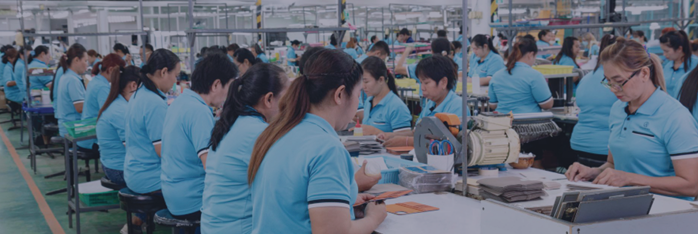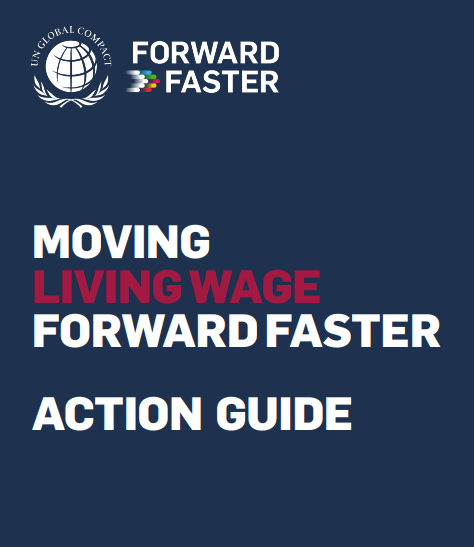How Paying Living Wages Tackles Inequality and Boosts Business for Adiantes
Start Reading

1. Company at a Glance
In this case example, we will explore how Adiantes, a Thailand-based leather goods manufacturer, made a strategic commitment to ensuring all employees earn a living wage. Through fair compensation policies, stakeholder collaboration and workforce development, the company has strengthened employee well-being while enhancing business resilience by paying living wages.
Manufacturing
Industry
2001
Founded
Thailand
Headquarters
250
Number of Employees
2. The Challenge
Thailand’s manufacturing sector has long been characterized by wage disparities and cost pressures, with many businesses relying on low wages to remain competitive. As a company known for high-quality craftsmanship, Adiantes recognized that its ability to attract and retain skilled workers was critical to maintaining product excellence and an opportunity to align ethical labour practices with its business strategy.
By committing to paying a living wage to 100 percent of its employees by 2030, the company aimed to safeguard its workforce’s financial stability and set an example of ethical leadership within the industry.
3. The Action
Adiantes implemented its living wage commitment through a series of structured steps:
Assessment and Benchmarking
To ensure that wage adjustments were fair, sustainable, and aligned with industry standards, the company conducted a comprehensive due diligence process, which included:
- Internal Wage Review: Analyzing the existing wage structure across all employee levels to identify gaps in relation to the cost of living.
- Industry Benchmarking: Comparing wages with industry standards and recognized living wage estimates to maintain competitiveness and fairness.
- Employee Feedback: Open communication with workers to understand their challenges and the need for living wages and inform the initiative’s development.
- Expert Guidelines: Reviewing recommendations from relevant organizations to align with best practices.
Internal Buy-In
Buy-in from senior management was essential in driving the vision and ensuring that the initiative was integrated into the company’s core values. They ensured that financial resources were allocated to support the initiative and guided the operations teams to implement it effectively.
Communication and Transparency
Adiantes clearly communicated the living wage commitment to employees, suppliers and partners, reinforcing trust and accountability.
Employee Welfare Programs
Alongside fair wages, Adiantes introduced welfare programs, including skills training, career development, and health benefits, to enhance workforce stability and morale.
Ongoing Monitoring and Evaluation
The company established a system for regularly assessing the impact of the initiative and refining strategies based on workforce needs and market dynamics.
Industry Collaboration
As sustainability and ethical practices increasingly become priorities for global businesses, Adiantes’ clients expressed a growing expectation for fair labour standards across the supply chain in meetings and collaborative initiatives. The company shared best practices with other manufacturers in Thailand’s leather goods sector to encourage broader industry adoption of living wages to ensure workers can afford a decent standard of living for themselves and their families.
4. Overcoming Barriers
Barrier
Financial Constraints: Implementing wage increases while maintaining business sustainability was a primary challenge.
Solution
The company adopted a staggered wage increase approach, gradually raising wages over time rather than implementing an immediate, large-scale adjustment. This allowed for better financial management while ensuring employees saw consistent improvements in their earnings.
Barrier
Workforce Planning & Stability: Ensuring stable employment and reducing reliance on temporary labour was essential.
Solution
The company collaborated with clients to align production volumes and forecasting, ensuring year-round employment for workers.
Barrier
Productivity Considerations: Higher wages needed to be balanced with operational efficiency to remain competitive.
Solution
An incentive-based payment structure was introduced, linking daily targets to productivity improvements.
Barrier
Industry Competitiveness: Paying living wages while staying cost-competitive in the market posed a challenge.
Solution
The company invested in skill development and training, enabling employees to enhance their craftsmanship and efficiency.
5. Impacts & Results
Workforce Stability:
64 percent of employees have been with the company for over a decade, and 44 per cent belong to an aging age group, highlighting the initiative’s role in fostering long-term employment.
Average Wage Increase:
The average inflation rate in the same years: 6.08 percent; 1.2 percent and 0.4 percent respectively
Employee Satisfaction:
Workers have reported increased financial security, improved quality of life, and greater job satisfaction.
Operational Excellence
A skilled and stable workforce has ensured consistent craftsmanship, bolstering Adiantes’ reputation for quality.
Customer Trust:
The initiative has strengthened Adiantes’ reputation as an ethical manufacturer, with clients praising its transparency and alignment with their corporate sustainability goals. Some customers have cited the living wage commitment as a decisive factor in maintaining partnerships, emphasizing its role in supporting sustainable and ethical practices.
6. Key Lessons Learned
"Ensuring fair living wages throughout our supply chain is both a responsibility and a key criterion in selecting our manufacturing partners. Adiantes' dedication to transparency and ethical labor practices aligns seamlessly with “ our values, establishing them as a trusted partner in producing high-quality, responsibly crafted watch straps."
RSM Watch Straps Adiantes' customer
Prioritize transparent collaboration
Engage clients and stakeholders early to align on production forecasting, product innovations, material sourcing, and long-term goals.
Invest in employee development
Beyond wages, focus on training and career advancement to build a loyal and skilled workforce.
Educate stakeholders on value
Demonstrating how financial stability for workers leads to consistent quality, a reliable workforce, and an ethically managed supply chain fosters shared understanding and mutual commitment.
Advocate for industry change
Share insights and best practices to inspire ethical labour standards across the sector.
Engage with initiatives
Engaging with international initiatives, such as the UN Global Compact and the Forward Faster Initiative, has been key to assessing our internal processes.
Long-term vision
Sustainability requires long-term vision, although paying living wages may incur higher costs in the short term, it ultimately proves to be beneficial for business in the long run
"True sustainability begins with transparent collaboration, long-term employee development, and a collective commitment to living wages. By working together with clients and stakeholders, we can build a workforce that is not only skilled but also financially secure."
TinTin Nilsson Head of Business Development, Compliance, & Business Improvement
7. Resources
Adiantes has been a participant of the UN Global Compact since 2015 and is committed to the Forward Faster Initiative Gender and Living Wage targets.
Inspired to take action?
Recommended UN Global Compact resources available to support your journey:


